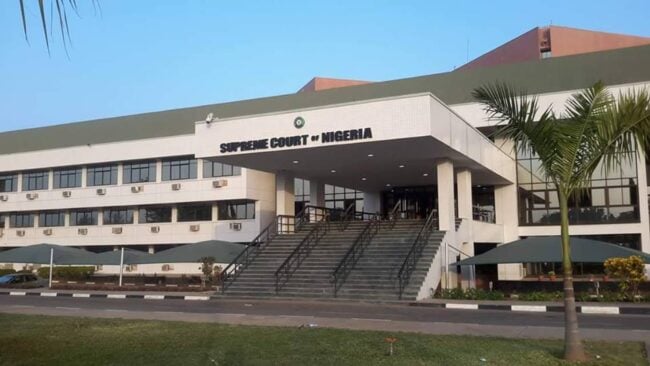Supreme court
Habeeb Abiru, a justice of the supreme court, refused to grant the relief sought by the federal government on LG autonomy.
The relief sought direct disbursement of funds from the federation account to the LGAs, while bypassing the state governments.
The federal government, through the attorney-general of the federation, had sued all 36 states of the federation over the contentious subject of financial autonomy for the 774 LGAs.
In the majority judgment delivered on July 11, the court criticised the practice of states creating and controlling caretaker committees, reiterating that local government chairpersons and councillors should be democratically elected as stipulated in the constitution.
Advertisement
Six of the seven-member panel of the apex court also ordered the federal government to withhold allocations of LGAs governed by unelected officials.
Although Abiru agreed that the local government should be run by democratically elected councils, he said there is no constitutional provision for the direct disbursement of funds from the federation account to the LGAs.
Citing the case of the ‘Attorney General of Abia state Vs Attorney General of the Federation supra’, the judge also held that the federal government ought not to meddle in the business of how states share the allocated money with the LG councils, adding that the LGs are not independent of states.
Advertisement
“Honestly, this is not, and should not be, the business of the plaintiff neither is it, and it should not be, the business of the court,” the judge held.
“It is and should be, a matter strictly between the states and the democratically elected members of the Local Government Councils.
“The Local Government Areas superintended over by the Local Government Councils are component parts of the States.
“There is no provision in the Constitution stipulating or regulating how the democratically elected members of the Local Government Councils should spend the funds allocated to them from the Federation Account.
Advertisement
“If they choose to cede part of the funds to the states to spend on their behalf on common services that are for their benefit, how is that the concern of the plaintiff or of the courts?
“The Constitution did not grant the Federal Government of Nigeria any oversight functions over how the democratically elected members of the Local Government Councils spend the funds allocated to them.”
He added that the plaintiff failed to adduce evidence to prove the allegations of “arm-twisting tactics, and allocation of ridiculously low amounts to Local Government Councils”.
“It is elementary that address of counsel, no matter how brilliant, cannot take the place of evidence,” Abiru held.
Advertisement
“A counsel cannot tacitly give evidence on an issue of fact under the guise of making submissions in his brief of argument.
“It is my candid view that the Plaintiff failed woefully to give this Court any exceptional or cogent and/or credible reason to depart from its finding in Attorney General of Abia State Vs Attorney General of the Federation supra.
Advertisement
“Section 162(5) and (6) of the 1999 Constitution stipulates the mode of payment of the funds due to the Local Government Areas of States from the Federation Account.
“These provisions are explicit and self explanatory. They do not admit, accommodate or concede the direct payment of the funds due to the Local Government Council from the Federation Account to the Local Government Councils.
Advertisement
“It is my understanding, on reading the provisions of Section 7 of the Constitution along with those of Section 162 of the Constitution together, that the essence of the mode of payment of the funds due to the Local Governments Areas of a State through the State provided for in the Constitution is in recognition of the fact that the Local Government Areas are constituent parts of and are subordinate to the State and to protect the concept of federalism contained in the Constitution.
“The prayer of the Plaintiff that this Court should order direct payments of the funds due to the Local Government Areas from the Federation Account to the Local Government Councils by the Federal Government, and thus bypassing the States, is in, my view, an invitation to this Court to engage in judicial legislation and to interpret the provisions of the Constitution in a manner that will undermine the very foundation of the nature of the federalism upon which the provisions of the Constitution were constructed.
Advertisement
“I have not seen any cogent and credible facts presented by the plaintiff to support the notion that the stipulated procedure for payment of the funds due to Local Government Areas from the Federation Account was not meeting the purpose for which the funds were allocated by the Constitution.
“There is thus no basis given for this court deviating from the constitutionally laid down mode of payment of the funds and directing another mode of payment.
“The answer to Questions 12 and 15 on the originating summons must be in favour of the Defendants.”
Read judgment here
Add a comment








